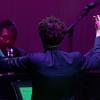
In a dark banana-tree-lined yard, two painted backdrops suspended on a lit frame furled and unfurled of their own accord. The sound was like the creaking of a wooden boat and the constant static of bugs. You could hear pulleys, recorded jungle noises, and music coming from a live orchestra. As I watched, I thought, “I will never forget this.”
This was On Blue, the first of three films with live music brought to the Nimoy Theater on Saturday, Nov. 23, by the restlessly curious and inventive contemporary ensemble Alarm Will Sound, presented by UCLA’s Center for the Art of Performance.
A sequel to Thai independent filmmaker Apichatpong Weerasethakul’s 2018 short film Blue, On Blue was scored by composer Rafiq Bhatia. This hauntingly patient work touches on the terror and peace of that state between dreaming and waking, and Bhatia’s score hovers somewhere between music and Foley effects.

On Blue is part of Sun Dogs, a series of music-and-film collaborations put together by composer Daniel Wohl and producer Kate Nordstrum of Liquid Music. Originally premiered in 2022 by the Cincinnati Symphony Orchestra in partnership with the FotoFocus Biennial, Sun Dogs has been retrofitted for Alarm Will Sound so that the smaller group can tour the works.
It was surprising to find out that these pieces were originally for a larger ensemble — such were the incredible skills in orchestration on display Saturday. Across all of the works, there was a similar pointillistic approach, with lots of jittery independent movement creating hazy shifts in emotion and color. If the show had been longer than one hour, more variety might have been needed, but Alarm Will Sound pulled off each piece spectacularly.

Naked Blue is a gorgeous grainy film in a surreal home-video aesthetic that depicts 13-year-old Oumy Bruni Garrel having her own ecstatic and touching dance party. Garrel is the daughter of a friend of filmmakers Mati Diop and Manon Lutanie, who wanted to portray Garrel at this transitional stage of her life. The score, by Devonté Hynes, felt somewhat distant from the footage, as if removed in time. In certain moments, the music seemed to correspond to actions in the film, yet these beats felt strangely out of place — by the end, it was still emotionally unclear if we were meant to be in the room with the young dancer or nostalgically watching an old home video of her.
The goal of Sun Dogs was to avoid the kind of one-sided, transactional relationship that filmmakers and composers can often have — the director delivering a finished product for the musician to complement. Of these first two films, On Blue had the stronger bond between music and visuals.

In the evening’s final film, Rise Again, the music and its role in the viewers’ experience were on equal footing with the emotional nuance of the visuals. Filmmaker Josephine Decker worked with six mothers from Upward Bound House, an organization that helps families transition out of homelessness, to bring their stories together and devise a central narrative. The women even got to listen to and respond to demos from composers Wohl and Arooj Aftab during the process. Ultimately, the film follows one mother, collectively portrayed by four of those women — Amy Bryan, Michaela Slaninova, Tracy Taylor, and Gisselle Martinez — living and caring for her children in the days surrounding being evicted.
The score and the film were so beautifully full of light amid all the pain and uncertainty. I was deeply struck by this vivid portrait of a gut-wrenching experience — losing the roof over one’s head — intermingled with the tender efforts of a mother to continue to care for her children. We see the kids standing next to the family car, brushing their teeth together, playing catch in the parking lot, getting tucked into bed in the backseat. The unity and richness of this collaboration were irresistible, and the message unshakeable. Tears were a welcome necessity.




